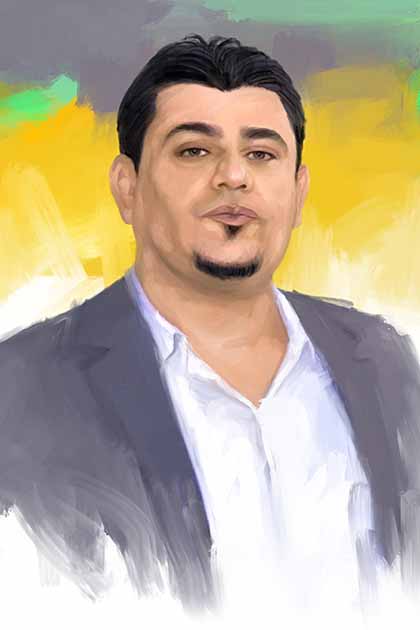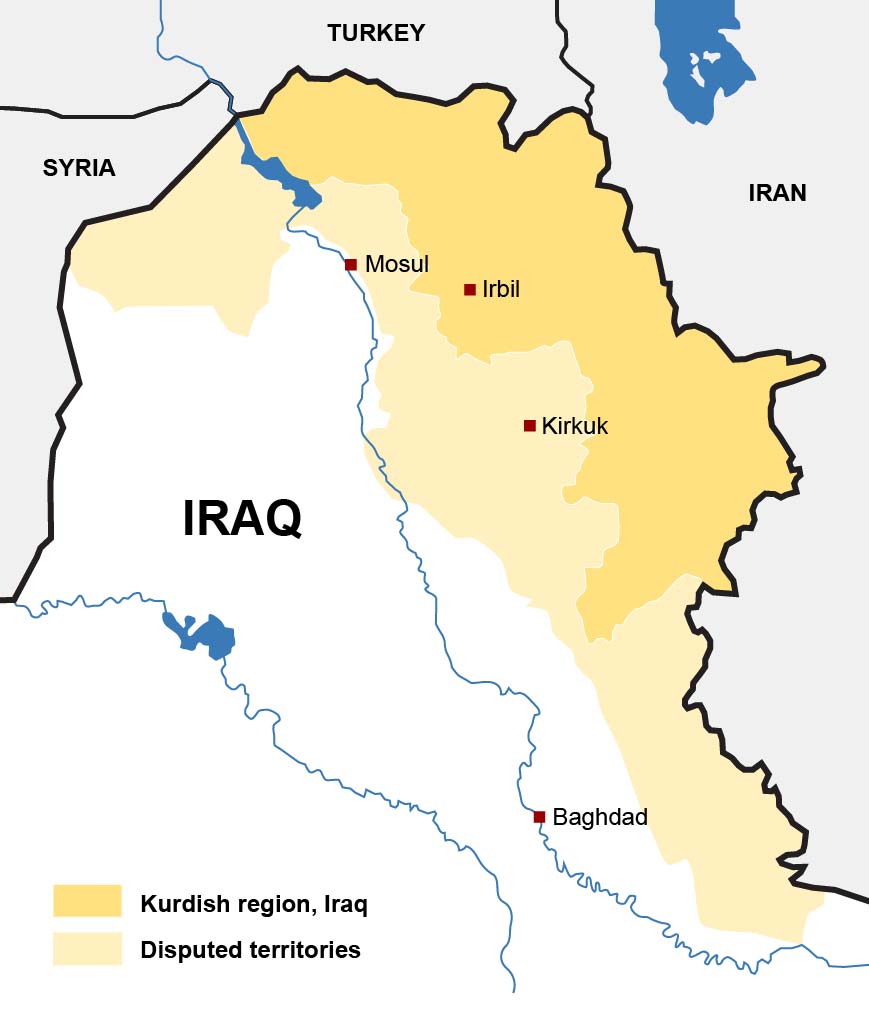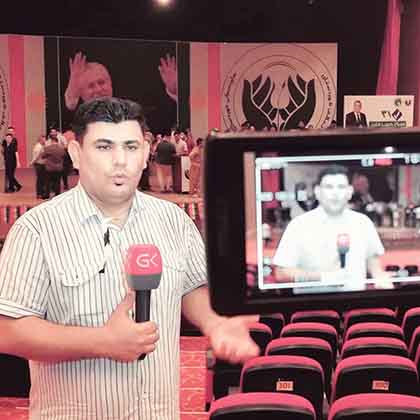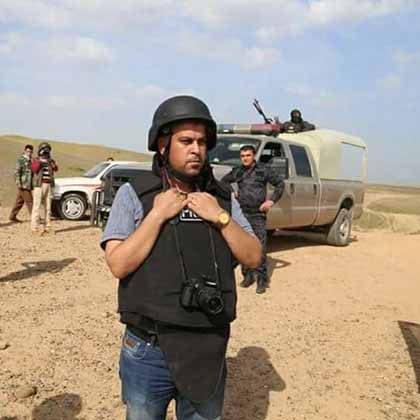
“They tell us that we as the Kurdish media exacerbate the problems; that's why they don't let us cover some events.”
—Azad Shukr
(Portrait by Lukman Ahmad | VOA News)
Safe Haven Fosters Vibrant Scene
Freedom — with limitations — for region’s media, after decades of repression
Iraqi Kurdistan serves as a concrete example of what other Middle Eastern countries fear, analysts say. Secession.
The region in many ways is a victim of its own success, overcoming the iron-fisted rule of Saddam Hussein to become a thriving, autonomous region with self-governance and a strong sense of identity.
A safe haven created by Western powers in 1991 to protect Iraqi Kurds from Saddam’s forces helped create the region where Kurds have the greatest autonomy.
Three decades on, the media can report openly, a press law exists to prevent journalists from being arrested for their work, and reporters can cover politics and society — to a point.
Russia
Caspian Sea
Georgia
Black Sea
Armenia
Azerbaijan
Turkey
AZ.
Predominantly
Kurdish
regions
Iran
Syria
Damascus
Baghdad
Iraq
Saudi Arabia
Jordan
Kuwait
The progress is widely welcomed, but reporters are still arrested or detained, and journalists can be attacked, threatened or harassed for apparent political affiliations.
When security agents in Sulaymaniyah briefly detained a crew working for VOA’s Kurdish service in August, they quizzed the journalists about their work and their political affiliations.
Media workers in an area disputed with Iraq say the situation there is even more complex. Baghdad’s response to a referendum on secession in that area led to a trickier environment, with journalists seeing an increase in harassment and obstruction.
“It’s humiliating to be a Kurdish journalist in Kirkuk and the disputed territories,” said Hazhar Rasheed, using a term to refer to the region that Baghdad and the Kurdistan Regional Government (KRG) both lay claim to.
The photojournalist at the privately owned Shafaq News added, “As soon as you open your mouth in Kurdish, they [Iraqi authorities] will do everything they can to prevent you from doing your work.”
Regional authorities, however, push back against criticism, pointing to steady progress over two decades and more reforms under way.
“KRG respects media freedoms, and it directs its policies toward protecting it under every circumstance,” Dindar Zebari, the KRG’s envoy for international advocacy, told VOA.
Celebration of identity
Life in Iraqi Kurdistan in 2022 is certainly a stark change to the 24-year rule of Saddam, whose forces used chemical gas as part of what rights groups describe as genocide that killed tens of thousands of Kurds.
During that period, Iraq also had no freedom of expression or space for criticism or dissent.
With Saddam gone, hundreds of Kurdish-language media outlets, schools and universities opened, and the red, yellow and green of the Kurdish flag are more ubiquitous than the Iraqi flag.
Streets in the cities of Irbil and Sulaymaniyah are lined with shops selling Kurdish music, books and movies. Billboards advertise local and international products in the local language.
The region now has dozens of websites, newspapers and TV stations, most affiliated with a political party. The most popular are Rudaw, which is seen as close to the ruling Kurdistan Democratic Party (KDP), and NRT, affiliated with the New Generation opposition.
The regional parliament in 2007 passed a press law that prevents journalists from being arrested for their work.
“I think making a comparative analysis of media rights between now and the past two decades would not be fair,” Zebari told VOA via a messaging app.
Despite that law and assurances of press freedom, rights groups say that the autonomous region’s two ruling parties — the KDP and the Patriotic Union of Kurdistan (PUK) — try to intimidate, arrest, harass and interrogate journalists.
Each party presides over different provinces, which further causes complications for reporters, who risk accusations of bias for alleged affiliation with the opposing party.

(Creative Commons)
And despite the press law, reporters are still arrested.
“Violations, discrimination and violence against journalists happen daily,” said Rahman Gharib, general coordinator of the Metro Center, an Iraqi press freedom advocacy group.
At least four journalists are currently detained in Iraqi Kurdistan. All are known for speaking out and writing against corruption and government policies.
Zebari, the KRG official, denied that the arrests are linked to journalism, telling VOA, “In the Kurdistan Region, the courts are independent. The regional government does not interfere in the judicial process.”
Disputed areas
Iraq’s disputed territories bring a separate, more repressive challenge.
When Iraqi Kurds in 2017 held an independence referendum, more than 90% voted for secession.
The vote was nonbinding, but it sent shock waves throughout Iraq and neighboring countries. Border crossings were closed, crucial oil exports halted, and flights suspended.
In the wake of the referendum, the Iraqi government sent forces to retake the oil-rich, multiethnic city of Kirkuk from the Kurdish Peshmerga, or military forces.
Now, under the control of Baghdad, Kurdish journalists in the city say they can no longer work freely.

Azad Shukr pictured during a live broadcast for Gali Kurdistan TV. (Azad Shukr)
One of those is Azad Shukr, a Kirkuk native and correspondent for Gali Kurdistan TV, a channel affiliated with the PUK.
He says Iraqi authorities deny Kurdish journalists access to press conferences and that their security forces often pull his car over to prevent him from attending events.
“We need to get a permit from Kirkuk’s Operations Room to do simple things such as shooting a B-roll of the streets and the bazaar. It takes days for them to grant us a permit,” he said.
Shukr and other reporters in Kirkuk say there are three firm red lines for media: cases that involve specific officials, “national security” issues that include questioning the war against the Islamic State, and coverage of the Popular Mobilization Forces (PMF), a pro-Iran group of militias created to fight the Islamic State terror group in 2014, which is accused of human rights abuses.

Photojournalist Hazhar Rasheed Kakayee on assignment in the disputed province of Kirkuk. (Rasheed Kakayee)
Rasheed, of the Shafaq News website, believes Iraqi authorities in Kirkuk target Kurdish media because they are freer to report on the province’s socio-political fissures.
“We, Kurdish journalists, always aim to tell the story the way it is,” he said. “If you look at the Kurdish media outlets, you will see that they are often freer than other media outlets [under Baghdad’s control],” he said.
Gharib, of the Metro Center, said that in the disputed territories such as Kirkuk, the problem is the prevalence of various armed groups and security forces.
“Neither the Iraqi law nor the Kurdistan apply there. Everybody has their own laws,” he said. “In the Kurdistan Region, we have laws, but they are not enforced.”
For photojournalist Rasheed, that environment can translate into physical aggression: security forces have broken his camera equipment, confiscated his press card, prevented him from covering events, and even dragged him by his collar in public.
Still, he can see the impact that reporting can have.
“Here in Kirkuk, when you become a voice for the people, I have noticed that the government sometimes listens,” he said.
When local media reported that street signs in Kurdish had been removed, the government pledged to restore them — a small win that brings hope and keeps reporters like Rasheed going.
“I still believe journalism can make a difference,” he said.